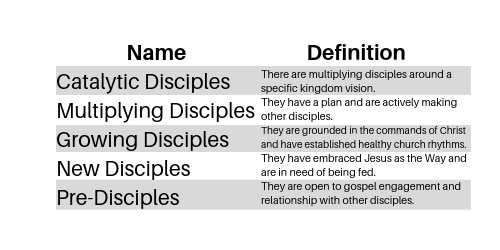
Four Benefits of a Disciple-Making Pipeline
Let’s face it; you don’t have to have a disciple-making pipeline to make disciples. I would say that very few churches have an intentional pipeline. At the same time, there may be some benefits that you might want to consider when it comes to a disciple-making pipeline.
Let’s start by looking at what is a disciple-making pipeline? A disciple-making pipeline is a structure for identifying and moving disciples from one level of development to the next. Our goal in developing and implementing a disciple-making pipeline is more and better disciples. We encourage churches to develop their unique disciple-making pipeline. The table below represents a generic disciple-making pipeline for beginning our conversation and for the development of your own disciple-making pipeline.

The benefits of an intentional disciple-making pipeline are numerous. Here are a few:
1. It depicts a clear pathway for growth. I can remember being a brand follower of Christ, thinking I want to be a good citizen. I had no clue what it meant to be a disciple or that as a disciple, I needed to grow. Imagine having a clear pathway with clearly delineated measures or competencies at each level of discipleship. Regardless of how you program around a pipeline, just having one would benefit any church serious about making disciples.
2. It allows you as a church to evaluate your disciple-making effectiveness. Once you develop your own disciple-making pipeline based on your disciple-making dream, you have a built-in tool for assessing your effectiveness. For example, if you don’t have any pre-disciples, it is a good indication that something is off about your overall disciple-making culture. The same could be true of any level of your pipeline where you may have a deficiency. A healthy disciple-making culture will have disciples at every level of the pipeline.
3. It integrates both evangelism and disciple-making. A common mistake that churches make is separating evangelism and disciple-making, but for Jesus evangelism was always a critical part of His disciple-making. His disciple-making always began with pre-disciples. Creating a disciple-making pipeline should always begin with pre-disciples.
4. It encourages the disciple-maker to focus on his/her area of greatest strength. We all have different passions and giftedness. I may have a passion for working with pre-disciples, while you may be gifted at working with multiplying disciples. Having a disciple-making pipeline gives us multiple areas and places to plug into the disciple-making process as a disciple-maker.
To learn more about a disciplemaking pipeline, connect with an Auxano Navigator.

Tags: David Putman, Disciplemaking, Disciplemaking Pipeline, Disciplemaking process












